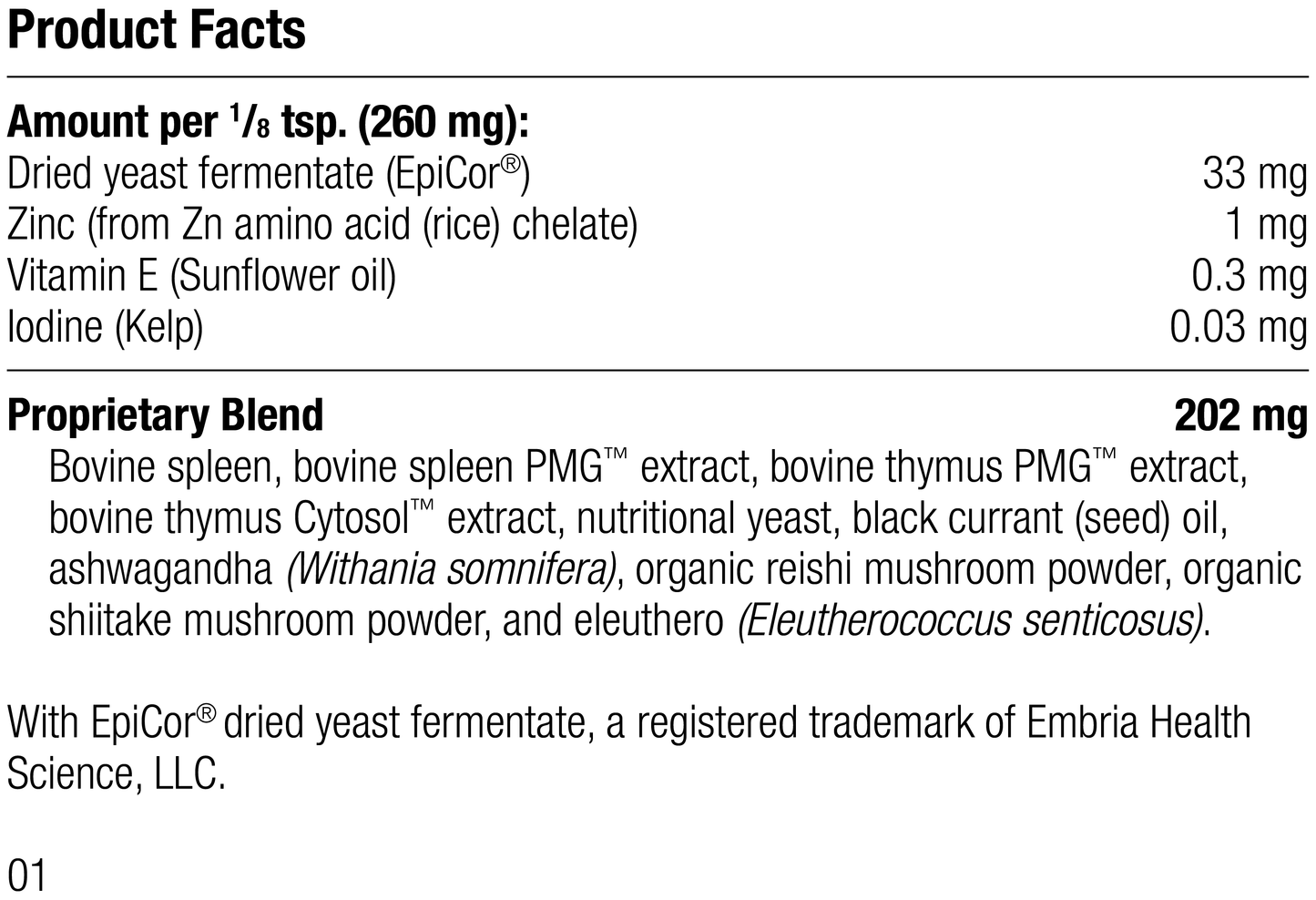- Provides nutritional and biochemical support for healthy immune system
- Supports healthy immune system function
- Supports immune cell health
- Supports endocrine health
- Supports healthy inflammatory processes
- Provides antioxidant support
- Beneficial for dogs responding to common environmental challenges
How the Canine Immune System Works
A dog’s immune system is a complex array of cells that are found throughout the body. Immune cells are designed to work in conjunction with other cells to provide a defense against unwanted invaders. The complexity of a dog’s immune system requires a multidimensional approach of nutritional factors. The nutritional support of the immune system is directed at facilitating normal function and is not intended to be suppressive or stimulating.
How Zinc Supports Canine Immune Health
Zinc plays a vital role in immune cell signaling. Zinc homeostasis influences immune cell activity, function, and development by directly influencing their formation or altering signal protein secretion.1-6
How Kelp Supports the Canine Immune System
Kelp is a whole food source of iodine. Iodine is thought to support the function of immune cells.7 Iodine also indirectly possesses antioxidant activity.8
Citations
- Wellinghausen, N., Kirchner, H. & Rink, L. The immunobiology of zinc. Immunology today 18, 519-521 (1997).
- Ibs, K.H. & Rink, L. Zinc-altered immune function. The Journal of nutrition 133, 1452s-1456s (2003).
- Maywald, M., Wessels, I. & Rink, L. Zinc Signals and Immunity. International journal of molecular sciences 18(2017).
- Kitamura, H., et al. Toll-like receptor–mediated regulation of zinc homeostasis influences dendritic cell function. Nature Immunology 7, 971-977 (2006).
- Maares, M. & Haase, H. Zinc and immunity: An essential interrelation. Arch Biochem Biophys 611, 58-65 (2016).
- Wessels, I., Maywald, M. & Rink, L. Zinc as a Gatekeeper of Immune Function. Nutrients 9(2017).
- Venturi, S. Current Chemical Biology 5, 155-162 (2011).
- Venturi, S. Evolutionary significance of iodine. Current Chemical Biology 5, 155-162 (2011).
Directions for Use:
For use in dogs. To support immune system.
Administer orally. Best if given with food. Includes 1/2 tsp. or 1/8 tsp. scoop.
| 1-10 lbs | 1/8 teaspoon 1x per day |
| 11-20 lbs | 1/8 teaspoon 2x per day |
| 21-40 lbs | 1/4 teaspoon 2x per day |
| 41-60 lbs | 1/2 teaspoon 2x per day |
| 61-80 lbs | 3/4 teaspoon 2x per day |
| >80 lbs | 1 teaspoon 2x per day |
Scoop Information
A 1/8 tsp scoop is included with the small canine powder bottles, and a 1/2 tsp scoop is included with the large canine powder bottles.
Suggested Use:
See dosage schedule
Warnings: For animal use only. Keep out of the reach of children and animals. In case of accidental overdose, contact a health professional immediately.
Cautions: Safe use in pregnant animals or animals intended for breeding has not been proven. If animal’s condition worsens or does not improve, stop product administration and consult your veterinarian.
Nutrients & Ingredients
Each Serving Size (1/8 level teaspoon) contains: Dried yeast fermentate (EpiCor®) 33 mg, Zinc (from Zn amino acid (rice) chelate) 1mg, Vitamin E (Sunflower oil) 0.3 mg, Iodine (Kelp) 0.03 mg. Proprietary Blend: 202 mg: Bovine spleen, bovine spleen PMG™ extract, bovine thymus PMG™ extract, bovine thymus Cytosol™ extract, nutritional yeast, black currant (seed) oil, ashwagandha (Withania somnifera), organic reishi mushroom powder, organic shiitake mushroom powder, and eleuthero (Eleutherococcus senticosus).
Please consult the actual product label for the most accurate product information.
*These statements have not been evaluated by the Food and Drug Administration. These products are not intended to diagnose, treat, cure, or prevent any disease.
Standard Shipping 3-5 business days


FAQ ABOUT THE PRODUCT
We've got you covered. Below are answers to some of the most frequently asked questions, providing you with all the details you need about this product and its benefits for your pet.









